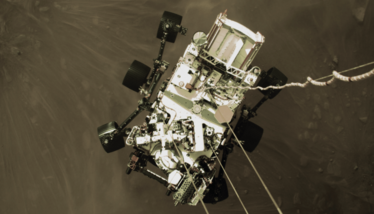Medicine Making on Mars
When astronauts are eventually sent to Mars, what will they do about medicine needs?

CREDIT: NASA/JPL-Caltech
NASA’s Perseverance Rover touched down on Mars on February 18 after a 6-month journey – and has provided some stunning visuals from the Red Planet. A key objective of the rover’s mission is to search for ancient signs of microbial life, characterize the planet’s geology and past climate, and pave the way for human exploration.
When humans are eventually dispatched to explore Mars, they are going to need many supplies: including medicine. But it won’t be feasible for the astronauts to take large quantities of medicine with them. Instead, scientists are exploring how medicines can potentially be made on demand in space or on Mars.
Lynn J Rothschild is a senior research scientist at NASA’s Ames Research Center has been working with Phil Williams, a professor of pharmacy at the University of Nottingham, UK, to create an “astropharmacy” system for astronauts to create biologic drugs on demand. The work combines pre-programed cells in spore form, genetic engineering, and a small volume system adapted from standard laboratory protocols. You can read more about the concept here.
Rothschild says: “There are plans for a long-term human presence on the moon and, eventually, to send humans to Mars. With current technology, it would take around six months to reach Mars and the astronauts would have to stay a year and a half for the planets to realign to minimize the journey time home. For such a long trip, you cannot possibly pack every potentially useful medicine. It would take up too much mass – and most medicines also have a limited shelf life, which would render them useless part way through the journey.”
Williams also gives his take on the project in this article – adding that any technology developed to make medicines on demand in space, could also be applied to remote regions on Earth. His PhD students are also working on a variety of space-themed projects relating to medicine.
Ultimately, space is a grueling environment and medicines will be essential. Williams explains why space is so harsh on the human body in this article. Space can also affect how the body responds to medicines. According to Williams: “Studies on the SpaceLab (the laboratory that flew in the bay of the Space Shuttle), for example, have shown that the rate of absorption (measured in saliva) of paracetamol and scopolamine/dexedrine from tablets were double after one day of space flight, and almost halved after two. Longer term changes caused by microgravity include muscle atrophy, insulin receptor desensitization (astronauts can be clinically diabetic after 30 days of spaceflight), retinopathy, and decalcification of bone (and the consequent deposition of calcium elsewhere, often as kidney stones).”
Read more about The Medicine Maker’s coverage on space medicine here.
Leverage Proven Technology to Speed Path to FIH

GPEx® Lightning is a fast, flexible way to shorten the path to production of phase 1 material. During this talk, we share the latest data leveraging GPEx® Lightning to generate highly stable, highly productive cell pools.

Making great scientific magazines isn’t just about delivering knowledge and high quality content; it’s also about packaging these in the right words to ensure that someone is truly inspired by a topic. My passion is ensuring that our authors’ expertise is presented as a seamless and enjoyable reading experience, whether in print, in digital or on social media. I’ve spent fourteen years writing and editing features for scientific and manufacturing publications, and in making this content engaging and accessible without sacrificing its scientific integrity. There is nothing better than a magazine with great content that feels great to read.



















